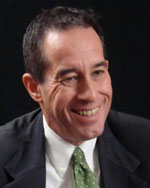
Neil Brown
Editor and Vice President, St. Petersburg Times
St. Petersburg, FL
[FL-E 0201]
I was a reporter at The Miami Herald in – must’ve been 1985. And my assignment at the time – I was what we called the government swing reporter; I did a lot of different government and development and political stories – was to cover the construction of Joe Robbie Stadium – what became Joe Robbie Stadium – a new stadium for the Miami Dolphins.
And like all stadium fights – and this, you know, now they’re routine these stadium fights, well this was in the old days – in the early days of that kind of thing – and Joe Robbie, the owner of the Dolphins, wanted to build a stadium and, of course, the county wanted to help him out because Miami Dolphins were such – as you guys remember – such a force and still remaining in the Miami area.
And so the County Commission to help facilitate what Joe Robbie himself used to tout all the time as the only privately-financed stadium in professional sports – because he was going to pay – again by today’s standards, ridiculous, is gonna be like $90 million for that stadium and now would probably cost five times that – and anyway – the only privately-financed stadium.
Well, the County Commission in Dade County gave him, for free, the land for the Stadium – right on the Dade-Broward border, which wouldn’t you know it was the only middle-class black neighborhood in Dade County, which always has had a very fascinating but difficult relationship between the Anglo population, the Hispanic population and the black population. Of which with the deep history of racial trouble in Miami, the black population, in particular, felt voiceless.
So they get it gifted from some land owner and to the County who then immediately turns it over free to Joe Robbie Stadium, so he’s got free land. The state then ponied up all kinds of state road work. So the privately-financed stadium had a pretty big contribution from the public sector. I say that passing no judgment on it – it might’ve been a very good policy – except for the homeowners in that particular area who felt very left out by the decision-making.
Now, that’s not a particularly new story and to bring it home to you. In that middle-class neighborhood was in fact a couple – Wilkie Ferguson and his wife, Betty Ferguson. Now, Judge Wilkie Ferguson was the first-ever state-appointed appellate judge in the state of Florida – and I got to double check that title if you want to know if he was a state appellate judge – but anyway he was a very prominent person and his wife was a very prominent person. These are people of education, means, and substance – who were fighting this.
And what – to get to your question – what I remember is that I would write a lot of stories, and as it turned out the publisher of the Miami Herald at the time – a guy named Dick Capen had endorsed the Stadium – in fact in a very difficult, for the reporter working for the Miami Herald, me, situation – we had a model of the Stadium at one point on display in the lobby of the Miami Herald. That put me in a real – you know you learn there among other things the difference between the editorial board and the newspaper as a whole.
My editors were very supportive of my coverage of this. Joe Robbie didn’t much care for it. But more to the point, is that we had – I would write a lot of stories about the potential displacement of the black middle class neighborhood in an area that didn’t have many enclaves like this, and I remember Judge Ferguson and his wife coming up to me – and these were powerful people in my view, and I was in my late 20s, mid 20s, at the time – and he came up to me and said, “Please don’t stop your coverage. We don’t – We can’t reveal this – We can’t shed the light.”
And as a young reporter to think myself, that here’s a judge and his wife of means and education, who said the newspaper is all we have in however this comes out. And they never asked me to do anything that was unfair, the didn’t ask me to slant anything. But they basically said to me, “Yeah, you may think we have some power, but you have no idea what kind of power The Miami Herald has – as an entity – and understand that.”
And I’d always worked for a guy down there – a guy named John Brecher (former city editor, The Miami Herald) – who used to say, “The reason to be in this business is to make the world a better place.”
That really captured it for me at a time when powerful people were saying to me, we need your help. Not just the voiceless people – who certainly I understood needed my help – but when people said, what you do is different and is a different kind of power than anything we have.
That was both humbling and quite…. You said, “Well, I knew I had to get it right. Now I really got to get it right.” You know – what a – what an important role a newspaper or a newsroom can play.


